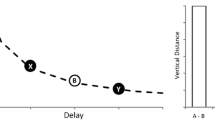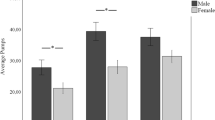Abstract
Eleven girls and nine boys, aged 41–59 months, chose repeatedly, under controlled laboratory conditions, between one sticker available immediately and three stickers available after 30 s. On the average, the children chose the immediate one sticker more often than the three delayed stickers (i.e., they more often demonstrated impulsiveness than self-control). The boys showed significantly more impulsiveness than did the girls. These data are consistent with other data collected using related procedures and preschool children, but they are in contrast to those collected using procedures very similar to those used here but with adult humans, who tend to show self-control. This research establishes a methodology and points to future directions for quantitative examination of the determinants of self-control in preschool-aged subjects.
Similar content being viewed by others
References
AINSLIE, G. W. (1974). Impulse control in pigeons. Journal of the Experimental Analysis of Behavior, 21, 485–489.
AINSLIE, G. W. (1975). Specious reward: A behavioral theory of impulsiveness and impulse control. Psychological Bulletin, 82, 463–496.
AMERICAN PSYCHIATRIC ASSOCIATION. (1987). Diagnostic and statistical manual of mental disorders (3rd ed.-Rev.). Washington, DC: Author.
BAUM, W. M., & RACHLIN, H. (1969). Choice as time allocation. Journal of the Experimental Analysis of Behavior, 12, 861–874.
BENTALL, R. P., & LOWE, C. F. (1982). Developmental aspects of human operant behaviour: The role of instructions and self-instructions. Behaviour Analysis Letters, 2, 186.
BENTALL, R. P., & LOWE, C. F. (1987). The role of verbal behavior in human learning: III. Instructional effects in children. Journal of the Experimental Analysis of Behavior, 47, 177–190.
BENTALL, R. P., LOWE, C. F., & BEASTY, A. (1985). The role of verbal behavior in human learning: II. Developmental differences. Journal of the Experimental Analysis of Behavior, 43, 165–181.
CAMPBELL, S. B., SZUMOWSKI, E. K., EWING, L. J., GLUCK, D. S., & BREAUX, A. M. (1982). A multidimensional assessment of parent-identified behavior problem toddlers. Journal of Abnormal Child Psychology, 10, 569–592.
COHEN, J., & COHEN, P. (1983). Applied multiple regression/correlation analysis for the behavioral Sciences (2nd ed.). Hillsdale, NJ: Erlbaum.
CROOKS, R. C. (1977). Magnitude of reward and preference in a delayed-reward situation. Psychological Reports, 40, 1215–1219.
EISENBERGER, R., & ADORNETTO, M. (1986). Generalized self-control of delay and effort. Journal of Personality and Social Psychology, 51, 1020–1031.
FUNDER, D. C., BLOCK, J. H., & BLOCK, J. (1983). Delay of gratification: Some longitudinal personality correlates. Journal of Personality and Social Psychology, 44, 1198–1213.
GROSCH, J., & NEURINGER, A. (1981). Self-control in pigeons under the Mischel paradigm. Journal of the Experimental Analysis of Behavior, 35, 3–21.
HARZEM, R., LOWE, C. F., & BAGSHAW, M. (1978). Verbal control in human operant behavior. The Psychological Record, 28, 405–423.
HERRNSTEIN, R. J. (1970). On the law of effect. Journal of the Experimental Analysis of Behavior, 13, 243–266.
HINSON, J. M., & LOCKHEAD, G. R. (1987). Momentary and global maximizing. Behavioural Processes, 14, 21–34.
HYDE, J. S., & LINN, M. C. (1988). Gender differences in verbal ability: A meta-analysis. Psychological Bulletin, 104, 53–69.
INOUYE, A., & SATO, S., & SATO, Y. (1979). Developmental study in delayed preference behavior. The Japanese Journal of Psychology, 50, 82–88.
JACKLIN, C. N. (1989). Female and male: Issues of gender. American Psychologist, 44, 127–133.
KANFER, F. H., & ZICH, J. (1974). Self-control training: The effects of external control on children’s resistance to temptation. Developmental Psychology, 10, 108–115.
KING, G. R., & LOGUE, A. W. (1987). Choice in a self-control paradigm with human subjects: Effects of changeover delay duration. Learning and Motivation, 18, 421–438.
KING, G. R., & LOGUE, A. W. (1990). Humans’ sensitivity to variation in reinforcer amount: Effects of the method of reinforcer delivery. Journal of the Experimental Analysis of Behavior, 53, 33–45.
LEA, S. E. G. (1979). Foraging and reinforcement schedules in the pigeon: Optimal and non-optimal aspects of choice. Animal Behaviour, 27, 875–886.
LITROWNIK, A. J., FRANZINI, L. R., GELLER, S., & GELLER, M. (1977). Delay of gratification: Decisional self-control and experience with delay intervals. American Journal of Mental Disorders, 82, 149–154.
LOGUE, A. W. (1988). Research on self-control: An integrating framework. Behavioral and Brain Sciences, 11, 665–679.
LOGUE, A. W., CHAVARRO, A., RACHLIN, H., & REEDER, R. W. (1988). Impulsiveness in pigeons living in the experimental chamber. Animal Learning & Behavior, 16, 31–39.
LOGUE, A. W., KING, G. R., CHAVARRO, A., & VOLPE, J. S. (1990). Matching and maximizing in a self-control paradigm using human subjects. Learning and Motivation, 21, 340–368.
LOGUE, A. W., & PENA-CORREAL, T. E. (1985). The effect of food deprivation on self-control. Behavioural Processes, 10, 355–368.
LOGUE, A. W., PENA-CORREAL, T. E., RODRIGUEZ, M. L., & KABELA, E. (1986). Self-control in adult humans: Variation in positive reinforcer amount and delay. Journal of the Experimental Analysis of Behavior, 46, 159–173.
LOGUE, A. W., RODRIGUEZ, M. L., PENA-CORREAL, T. E., & MAURO, B. C. (1984). Choice in a self-control paradigm: Quantification of experience-based differences. Journal of the Experimental Analysis of Behavior, 41, 53–67.
LOGUE, A. W., SMITH, M. E., & RACHLIN, H. (1985). Sensitivity of pigeons to prereinforcer and postreinforcer delay. Animal Learning & Behavior, 13, 181–186.
LOW, B. S. (1989). Cross-cultural patterns in the training of children: An evolutionary perspective. Journal of Comparative Psychology, 103, 311–319.
LOWE, C. F. (1979). Determinants of human operant behaviour. In M. D. Zeiler & P. Harzem (Eds.), Reinforcement and the organization of behaviour (pp. 159–192). New York: Wiley.
LOWE, C. F. (1983). Radical behaviorism and human psychology. In G. C. L. Davey (Ed.), Animal models of human behavior (pp. 71–93). New York: Wiley.
MACCOBY, E. E., & JACKLIN, C. N. (1974). The psychology of sex differences. Stanford: Stanford University Press.
MATTHEWS, B. A., SHIMOFF, E., CATANIA, A. C., & SAGVOLDEN, T. (1977). Uninstructed human responding: Sensitivity to ratio and interval contingencies. Journal of the Experimental Analysis of Behavior, 27, 453–467.
MAWHINNEY, T. C. (1982). Maximizing versus matching in people versus pigeons. Psychological Reports, 50, 267–281.
MAZUR, J. E., & LOGUE, A. W. (1978). Choice in a “self-control” paradigm: Effects of a fading procedure. Journal of the Experimental Analysis of Behavior, 30, 11–17.
MCDIARMID, C. G., & RILLING, M. E. (1965). Reinforcement delay and reinforcement rate as determinants of Schedule preference. Psychonomie Science, 2, 195–196.
MILLAR, A., & NAVARICK, D. J. (1984). Self-control and choice in humans: Effects of video game playing as a positive reinforcer. Learning and Motivation, 15, 203–218.
MILLER, D. T., WEINSTEIN, S. M., & KARNIOL, R. (1978). Effects of age and self-verbalization on children’s ability to delay gratification. Developmental Psychology, 14, 569–570.
MISCHEL, H. N., & MISCHEL, W. (1983). The development of children’s knowledge of self-control strategies. Child Development, 54, 603–619.
MISCHEL, W. (1966). Theory and research on the antecedents of self-imposed delay of reward. In B. A. Maher (Ed.), Progress in experimental personality research (pp. 85–132). New York: Academie Press.
MISCHEL, W., & GRUSEC, J. (1967). Waiting for rewards and punishments: Effects of time and probability on choice. Journal of Personality and Social Psychology, 5, 24–31.
MISCHEL, W., & METZNER, R. (1962). Preference for delayed reward as a function of age, intelligence, and length of delay interval. Journal of Abnormal and Social Psychology, 64, 425–431.
MISCHEL, W., SHODA, Y., & RODRIGUEZ, M. L. (1989). Delay of gratification in children. Science, 244, 933–938.
MISCHEL, W., & STAUB, E. (1965). Effects of expectancy on working and waiting for larger rewards. Journal of Personality and Social Psychology, 2, 625–633.
MOORE, B. S., CLYBURN, A., & UNDERWOOD, B. (1976). The role of affect in delay of gratification. Child Development, 47, 273–276.
RACHLIN, H., & GREEN, L. (1972). Commitment, choice and self-control. Journal of the Experimental Analysis of Behavior, 17, 15–22.
RAGOTZY S. P., BLAKELY, E., & POLING, A. (1988). Self-control in mentally Goretarded adolescents: Choice as a function of amount and delay of reinforcement. Journal of the Experimental Analysis of Behavior, 49, 191–199.
RESNICK, L. B. (1989). Developing mathematical knowledge. American Psychologist, 44, 162–169.
RODRIGUEZ, M. L., MISCHEL, W., & SHODA, Y., (1989). Cognitiye person variables in the delay of gratification of older children at risk. Journal of Personality and Social Psychology, 57, 358–367.
RUTTER, M. (1977). Speech delay. In M. Rutter & L. Hersov (Eds.), Child psychiatry: Modern approaches (pp. 688–716). Philadelphia: Lippincott.
SARAFINO, E. P., RUSSO A., BARKER, J., CONSENTINO, A. M., & TITUS, D. (1982). The effect of rewards on intrinsic interest: Developmental changes in the underlying processes. The Journal of Genetic Psychology, 141, 29–39.
SCHWARZ, J. C., & POLLACK, P. R. (1977). Affect and delay of gratification. Journal of Research in Personality 11, 147–164.
SCHWARZ, J. C., SCHRAGER, J. B., & LYONS, A. E. (1983). Delay of gratification by preschoolers: Evidence for the validity of the choice paradigm. Child Development, 54, 620–625.
SCHWEITZER, J. B., & SULZER-AZAROFF, B. (1988). Self-control: Teaching tolerance for delay in impulsive children. Journal of the Experimental Analysis of Behavior, 50, 173–186.
SHIMOFF, E., CATANIA, A. C., & MATTHEWS, B. A. (1981). Uninstructed human responding: Sensitivity of low-rate performance to schedule contingencies. Journal of the Experimental Analysis of Behavior, 36, 207–220.
SHULL, R. L., SPEAR, D. J., & BRYSON, A. E. (1981). Delay or rate of food delivery as a determiner of response rate. Journal of the Experimental Analysis of Behavior, 35, 129–143.
SONUGA-BARKE, E. J. S., LEA, S. E. G., & WEBLEY, P. (1989). The development of adaptive choice in a self-control paradigm. Journal of the Experimental Analysis of Behavior, 51, 77–85.
WALSH, R. P. (1967). Sex, age, and temptation. Psychological Reports, 21, 625–629.
Author information
Authors and Affiliations
Corresponding author
Additional information
This research was supported in part by Nsf Grant Bns-8416302, A. W. Logue, Principal Investigator, and by a Sigma Xi Grant-in-Aid of Research to Adolfo Chavarro.
Rights and permissions
About this article
Cite this article
Logue, A.W., Chavarro, A. Self-Control and Impulsiveness in Preschool Children. Psychol Rec 42, 189–204 (1992). https://doi.org/10.1007/BF03399597
Published:
Issue Date:
DOI: https://doi.org/10.1007/BF03399597




